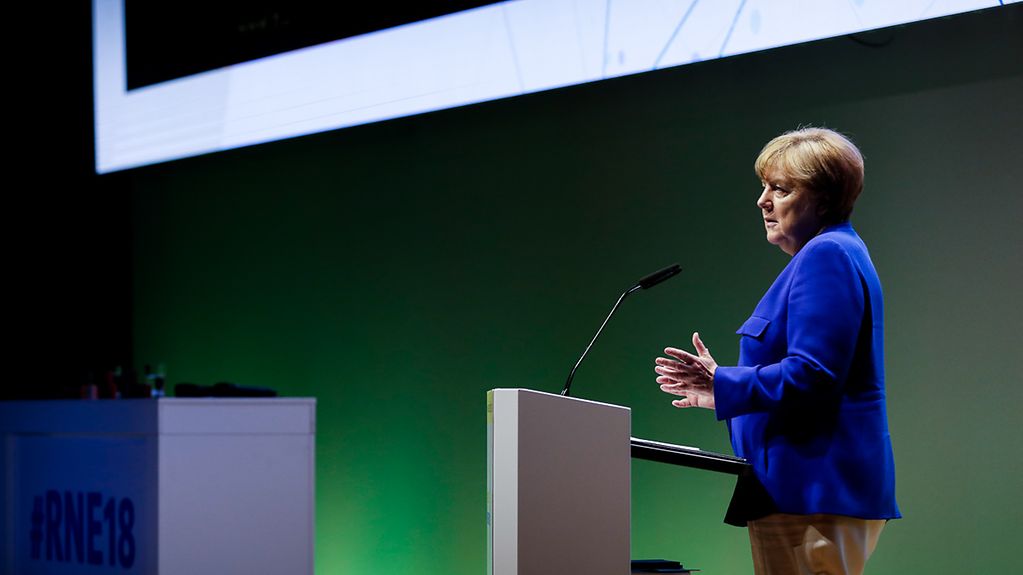The future of the European Union
Chancellor Angela Merkel has presented her plans for the future of the European Union. She urged that the EU enforce its shared values and convictions resolutely. Europe, she said, is at a crossroads. "If we stand still, we will be ground down by vast global structures."
3 min reading time

"Europe must redefine its role in this world," said the Chancellor
Photo: Denzel/Bundesregierung
In a changing world, Europe must redefine its role, said Chancellor Angela Merkel at the annual conference of the German Council for Sustainable Development. "We can all see that the world order is being redrawn."
The bipolar order that prevailed during the Cold War has given way to a multipolar world with the USA as a superpower and China growing dynamically. Escape into a world of purported simple fixes and withdrawal into nationalism is the wrong way to go, declared the Chancellor. What is needed, is a convincing European response. "We need a huge European effort in order to anchor the European Union within the global order of the 21st century, and once again make a comprehensive pledge of security."
Europe is a promise of peace
"The European Union was always a pledge of prosperity and peace," stressed Angela Merkel. To underpin this in future too, the Chancellor identified five areas in which action is needed.
1. Common foreign, defence and security policy
Angela Merkel proposed that in future the non-permanent seat on the United Nations Security Council be taken not by any one European nation, but be designated a European seat. A European security council should also be created, to enable the EU to act faster – member states would rotate on the council.
A European white paper on security policy could identify challenges jointly, and thus enhance cooperation in the fields of defence and development policy.
2. Common development, migration and asylum policy
How should we respond to illegal migration? How can we create a common asylum system? How can we put in place a development agenda that genuinely helps create prosperity and sustainability, and not only here in Europe? From the point of view of the Chancellor, the "greatest threat to the future of the European Union" lies here.
The Chancellor thus proposed a common European asylum system, a European border security force and a system of flexible solidarity among member states. Angela Merkel also called for rigorous action to address the root causes of displacement through a new compact with Africa, "a Marshall Plan with Africa".
3. Common science and research, economic and monetary union
The social market economy of the 21st century has come under pressure, while the digital economy is posing a major challenge, said Angela Merkel.
The Chancellor called for increased research spending, investment in the future equivalent to three percent of gross domestic product (GDP). Angela Merkel also proposed, "that we in Europe have common networks of excellent teaching and research facilities, that we address the challenge posed by artificial intelligence, but in an ethically responsible manner".
Finally, the Chancellor advocated taking economic and monetary union, especially the euro zone, to the next level. Angela Merkel proposed a European monetary fund, that should be structured along the same lines as the International Monetary Fund. If the euro zone is in danger, the European monetary fund must be able, for instance, to issue loans. "We should really make provision for all possible crises."
Angela Merkel further proposed an investment budget, so that the economic strengths and the prosperity levels in individual member states can be brought into alignment.
She also called for multilateral trade agreements and a strong World Trade Organization. Wherever necessary, "fair, bilateral trade agreements should be concluded," said the Chancellor.
4. Common union for education, cultural diversity and safeguarding the integrity of the creation
A European youth office could help bring European issues to young people. Exchange programmes not only for students, but also for young people undertaking vocational training courses, and common vocational qualifications are a good way forward, said Angela Merkel. Xenophobia and anti-Semitism must be forcefully countered.
5. A European Union that is better able to take action than is the case today
"If we stand still, we will be ground down by global structures – the alternative is that we decide to enforce our shared interests, values and convictions in everyday global life, consistently and in line with the principles of liberty, the rule of law and democracy," summed up the Chancellor. Reducing the size of the Commission should not, she added, be a taboo subject.